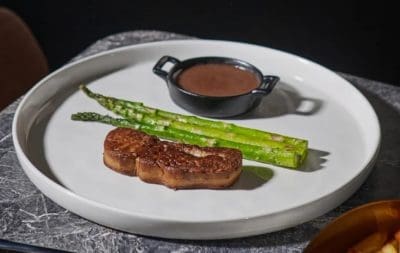IT HAS taken more than two years, but lab-grown or cell-cultivated meat is now allowed to be consumed in Australia after a recently gaining regulatory approval from Food Standards Australia New Zealand (FSANZ).
The approval was given to Sydney’s Vow, a lab-grown meat startup for its Japanese quail foie gras.
FSANZ said the approval is just for the use of cell-cultured quail as a food.
“The Australia and New Zealand-first approval allows the sale of cell-cultured quail and establishes new standards in the Code to provide a clear regulatory framework for future cell-cultured food applications,” said a FSANZ spokesperson.
“Other cell-cultured foods must be assessed and approved by FSANZ before they can be sold.
“Australia, New Zealand and Singapore are the only countries where Vow’s cell-cultured quail products are approved for sale.”
But Professor Paul Wood, Adjunct Professor in Biotechnology at Monash University said the approval will make it easier for other products to become registered for consumption.
“Every product will still have to get a licence and prove it is safe for consumption firstly and meet other regulatory standards,” he said.
“But instead of it taking two-and-a-half-years, it is estimated registration will take 12 to 18 months.”
Vow states on its website it is serving its cultured Japanese quail in more than 25 venues in Singapore and has produced two tonne of cultured meat. The company says the quail will be sold via its ‘Forged’ brand in a select number of restaurants to start with.
Singapore was the first country to approve lab-grown meat for human consumption, whereas Italy, Austria and several states in the United States have banned the product from being sold. The Italian farm lobby labelled it ‘Frankenstein meat‘
Decision does not pass the pub test
The cattle industry’s peak lobby group Cattle Australia has been critical of the process FSANZ has followed, raising a series of concerns earlier this year.
Chief executive officer Dr Chris Parker said the concerns were not listened to.
“The decision to allow lab-grown quail protein to be sold to consumers fails the pub test when it comes to communicating to consumers exactly what they are eating,” Dr Parker said.
“It is very disappointing that industry concerns regarding food safety, product transparency and truth in labelling requirements have largely been ignored by FSANZ. These concerns were clearly communicated to FSANZ during the public consultation process but there has been very little change in the regulatory requirements it is placing upon these laboratories.
“For example, while FSANZ says this lab-grown product is safe to eat, the processes and ingredients used to produce these types of products are often ‘commercial in confidence’ so it is almost impossible for a consumer to find out what is actually in this stuff.”
With recommendations to change the labelling of plant-based lab grown meat still not implemented by the Federal Government, Dr Parker said consumers will be further confused by the new product.
“Further confusing consumers is FSANZ’s ruling to allow the product to be described as ‘meat’ as long as the words ‘cell-cultured’ or ‘cell-cultivated’ are also used. ‘Cell-cultured quail’ doesn’t adequately describe to consumers that they are in fact eating fake meat.
“Labelling standards for plant-based or lab-grown proteins should prohibit any reference to animal food products, including the words meat, beef, lamb and goat – and in this case quail.
“And the use of livestock images packaging or marketing materials for on plant or synthetic protein should also be outlawed as it is a deliberate deception of consumers designed to dupe them into believing they are eating something that they are not.
“CA strongly believes beef should be defined in law as only including products derived from actual livestock raised by cattle producers, and we will continue to make this case to FSANZ and the Federal Government.”
Cost remains the biggest prohibitor for mass production
Professor Wood said the cost to produce the lab-grown or cell-cultured meat was prohibiting it being produced on a mass scale.
“Vow is targeting around $100 per kilogram to produce its Japanese quail, and they can’t produce a lot of it,” he said.
“So that is competing against a very high-end steak.
“But most companies in this space are producing sausages, burgers, dumplings, imitations of commodity meat and they’re not even going to get close to the price of red meat mince.
“So price will rule them out of that market.”
The other prohibiting factor is the cost of the equipment.
“It is equivalent to the equipment used to produce vaccines and monoclonal antibodies, so it is very sophisticated equipment and very expensive,” said Professor Wood.
“All of this needs to be done in a completely sterile environment, because if you get any contamination in your product, it completely overgrows your cells and that can happen so fast.
“So it requires super clean spaces, people walking around in full body suits, not to protect themselves but to protect the culture from them.
“So the quality of the facility you need to produce super sterile product also adds to the cost.
“For a reasonable sized factory to produce lab-grown meat it is estimated to cost $450 million US.”
Professor Wood said lab-grown meat is not the answer for the growing population and will not be a viable protein source for developing countries.
“Vow is talking about producing a tonne of product a month. That is what a corner butcher might turn over in a couple of days,” he said.
“So we are not talking about anything that has a remote chance of being a replacement for red meat.
“The areas where the world is expected to grow in population are the people who can least afford a product a high-end product like this.”
Who is the customer?
Professor Wood believed the lab grown meat would remain a niche product, predominantly sold in high-end restaurants.
“Vow call it a new food experience and that is clever,” he said.
“We saw plant-based products make the mistake of saying it was like meat, but it wasn’t and the customer was disappointed when it wasn’t like meat.
“I have tasted Vow’s Japanese quail in Singapore. It is very nice but it is very rich, it is not a main meal, it is a bite size, very elegantly produced product. But it cost $30 Singaporean for a bite, so this product is for high-end foodies.”
At the peak of alternative proteins, they got one percent of the US market according to Professor Wood.
“I think lab-grown meat, especially the mince and sausages are going to compete with the plant-based products, not red meat,” he said.
“It is not for vegans or vegetarians because it is still an animal product, and it can’t compete in price with red meat.”



Are you kidding!
This is rubbish – distilled meat: great marketing.
We have so much to our advantage: great natural product; world’s best technology and management to bring to the consumer. Cooked to perfection and become the steak capital of the world (Sydney). It’s a joke!
The industry must not cringe but get on the front foot and consign this fake food to the realm of fantasy land!
At best a few might give this stuff a taste and switch back without another thought.
Australian beef today is exquisite.